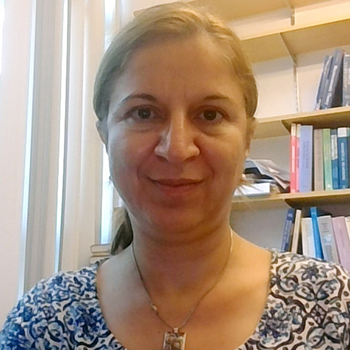Faculty develop innovative Open Educational Resources (OER) that are aligned with the United Nations Sustainable Development Goals (UN SDGs) and reveal the positive impact on teaching and learning. Faculty members who are engaged in the process of creating OER reveal the impact this has on the teaching and learning experience, both in the classroom and beyond. They note that the interactive resources provide a tremendous opportunity for both instructors and students to learn and adapt as the world becomes increasingly more digitized.
Tsvetanka Karagyozova, assistant professor (teaching stream), Department of Economics, Faculty of Liberal Arts & Professional Studies (LA&PS), sees connections to many SDGs in the OER she developed with an interdisciplinary team.
“I was interested in creating OER because textbooks and peer-reviewed course materials are the gold standard in economics but over time they become more expensive,” adds Karagyozova. “At York, I typically leave one copy of the textbook required for the course on reserve at the Scott Library, so I can see how well-used that textbook is.”
Karagyozova was part of a group of York collaborators, including Ida Ferrara, associate professor, LA&PS, and Edward Furman, professor, Faculty of Science, and Ricardas Zitikis, an associate professor of statistics from Western University. They also secured support from research assistants, a project manager and Xpan, an external contractor for the virtual reality (VR) experiment.
United under the Risk and Insurance Studies Centre (RISC) at York, they received funding from eCampusOntario Virtual Learning Strategy (VLS) program to develop a fully online course, Economics of Insurance and Decision Making Under Risk, accompanied by a VR behavioural lab. Because this OER uses a Creative Commons licence, it allows others to freely adopt, adapt, and build on the materials.

“Some of the SDGs are embedded in the course materials,” Karagyozova explains. “One of the modules, for example, is dedicated to microinsurance and economic growth. We look at how microinsurance can promote sustainable and inclusive growth in developing countries, serving as a risk mitigation mechanism that can break the poverty cycle and elevate women out of poverty.” This directly addresses UN SDG 1 (no poverty) and UN SDG 5 (gender equality, and empowering women and girls).
She adds that with the high cost of textbooks, students in developing nations sometimes do not have access to basic learning materials. OER within niche fields like hers can be shared with learners globally, opening them up to the world.
Full story is available on YFile.
